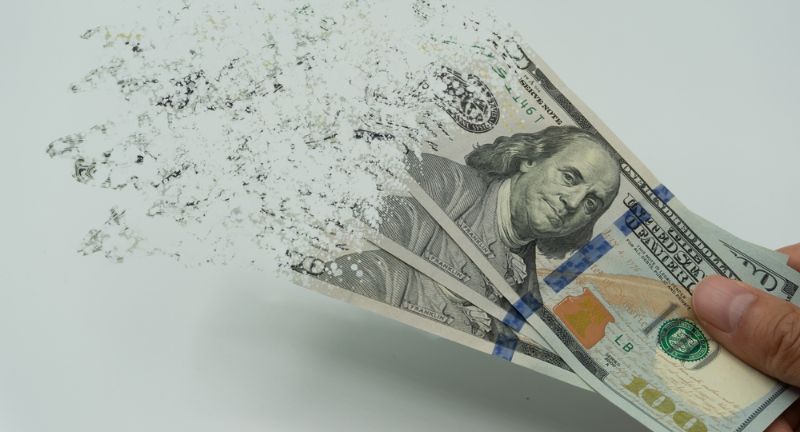NEWS
16 Signs Someone Is Way More Broke Than They Seem
Published
2 months agoon

Shutterstock
Appearances can be deceiving, especially when it comes to financial status. Many people project an image of wealth and success, but the reality might be far from what it seems. Identifying the subtle signs of financial struggle can be crucial for understanding someone’s true situation. Here are 16 signs that someone might be much poorer than they appear.
From prioritizing appearance over essentials to using credit to maintain a lifestyle, these indicators can reveal hidden financial stress. Recognizing these signs not only fosters empathy but also encourages more meaningful support and understanding. Let’s delve into the subtle yet telling signs that someone’s financial situation might be more precarious than it looks.
Expensive Car But Lives in a Cheap Apartment

Shutterstock
Driving an expensive car while living in a modest apartment can be a sign of financial imbalance. This choice might indicate that the individual prioritizes outward appearances over financial stability. The high cost of maintaining a luxury vehicle can strain finances, leading to sacrifices in other areas of life. Such behavior often points to a desire to project wealth, even if it means compromising on living conditions.
Frequent Luxury Shopping but Complains About Bills

Shutterstock
Indulging in luxury shopping sprees while frequently complaining about bills is a red flag. This behavior suggests that the person might be living beyond their means, using credit to finance a lavish lifestyle. The contrast between their shopping habits and financial complaints can indicate underlying financial stress. It’s a clear sign that the outward appearance of wealth is masking deeper financial problems.
Always Using Credit Cards

Shutterstock
Reliance on credit cards for everyday expenses is a significant indicator of financial trouble. While credit cards can be useful, constantly using them instead of cash or debit can signal a lack of available funds. This habit can quickly lead to mounting debt and high interest payments. It’s a sign that the person might be struggling to manage their finances effectively.
Skipping Meals or Eating Cheap Fast Food

Shutterstock
Consistently skipping meals or relying on cheap fast food can indicate financial difficulties. While these habits can sometimes be attributed to convenience, they often suggest that money is tight. Poor dietary choices may be a way to save money, sacrificing health in the process. This is a strong sign that someone might be cutting corners to make ends meet.
Borrowing Money Frequently

Shutterstock
Frequent borrowing from friends, family, or payday loans indicates financial instability. This reliance on borrowed funds to cover basic expenses suggests that the person is not living within their means. Borrowing often can lead to strained relationships and a cycle of debt that’s hard to break. It’s a clear sign that despite appearances, financial health is lacking.
Overdrafting Bank Accounts

Shutterstock
Regularly overdrafting bank accounts is a telltale sign of financial distress. Overdraft fees can quickly add up, worsening an already precarious financial situation. This habit indicates that the person is struggling to balance their income with their expenses. It’s a clear indicator that they might be living paycheck to paycheck, despite outward appearances.
Delaying Medical and Dental Care

Shutterstock
Putting off medical and dental care can be a sign of financial hardship. Healthcare costs can be significant, and delaying care suggests that the person cannot afford these expenses. This behavior often leads to more severe health issues down the line, indicating a dangerous compromise on health due to financial constraints. It highlights the hidden struggles behind a seemingly stable facade.
Unpaid or Late Bills

Shutterstock
Consistently having unpaid or late bills is a strong indicator of financial issues. This habit can lead to additional fees and damaged credit scores, creating a vicious cycle of financial trouble. It suggests that the person is struggling to manage their budget and prioritize payments effectively. Despite a polished exterior, their financial foundation may be crumbling.
Avoiding Social Outings Due to Cost

Shutterstock
Declining social invitations due to cost is a subtle but telling sign of financial struggle. While it’s common to skip events occasionally, frequently avoiding them to save money suggests deeper issues. This behavior can lead to social isolation and a reduced quality of life. It’s a clear indicator that the person’s financial situation is tighter than it appears.
Ignoring Maintenance and Repairs

Shutterstock
Neglecting necessary maintenance and repairs, whether for a car or home, indicates financial constraints. These issues, if left unattended, can lead to more significant problems and expenses down the line. The inability to afford routine upkeep suggests that the person is struggling with their finances. It’s a clear sign that they might be prioritizing immediate needs over long-term investments.
Constantly Switching Jobs

Shutterstock
Frequent job changes can be a sign of financial instability. This pattern might indicate that the person is struggling to find stable, well-paying employment. Constantly switching jobs can also reflect a lack of financial planning and long-term career strategy. It suggests that despite outward appearances, their financial and professional life may be unsettled.
High Interest Payday Loans

Shutterstock
Relying on high-interest payday loans is a clear indicator of financial trouble. These loans are often a last resort, used by those who cannot secure traditional credit. The high interest rates can trap borrowers in a cycle of debt, exacerbating financial woes. It’s a strong sign that the person is struggling more than they let on.
Minimal or No Savings

Shutterstock
Having little to no savings is a significant sign of financial insecurity. This lack of financial cushion means the person is unprepared for emergencies or unexpected expenses. Living without savings can lead to high stress and financial anxiety. Despite any outward signs of wealth, their financial situation may be more precarious than it seems.
Using Possessions to Get Loans

Shutterstock
Using possessions as collateral for loans is a sign of financial distress. Pawning items or taking out secured loans indicates that the person is desperate for cash. This practice can lead to losing valuable possessions if loans are not repaid. It’s a clear sign that despite outward appearances, they are struggling financially.
Struggling with Basic Necessities

Shutterstock
Difficulty affording basic necessities like groceries and utilities is a clear sign of financial trouble. This struggle indicates that the person might be living paycheck to paycheck, unable to cover essential expenses. It suggests that their financial situation is much tighter than it appears. Recognizing this sign is crucial for understanding their true financial health.
Unpaid Debts to Friends and Family

Shutterstock
Having unpaid debts to friends and family is a significant red flag. This situation suggests that the person has exhausted other financial options and is relying on personal loans to get by. Unpaid debts can strain relationships and indicate a deeper financial crisis. It’s a clear sign that despite appearances, they are struggling to manage their finances.
Conclusion

Shutterstock
Recognizing the signs of hidden financial struggles can foster empathy and understanding. It’s important to look beyond appearances and offer support to those who might be quietly struggling. These signs can help identify who might need help and encourage more open conversations about financial well-being. Ultimately, understanding these indicators can lead to a more compassionate and supportive community.
Related Topics:

More From Financially+
-


Does Gen Z Spell The End Of The Republican Party?
-


20 Policies Conservatives Support That Are Wrecking The Middle Class
-


Universal Basic Income: 14 Reasons Everyone Deserves Free Money
-


The Million-Dollar Myth: Retire Rich Without the Fortune
-


20 States Pushing for Higher Minimum Pay Amid Fierce Opposition
-


17 Powerful Reasons You Should Make the Leap and Move…
-


23 Policies Democrats Would Relentlessly Enforce If They Had Unlimited…
-


Beware: 10 Locations Where You Shouldn’t Plug in Your Phone
-


19 Startling Reasons Why Moving to Texas Is Probably a…